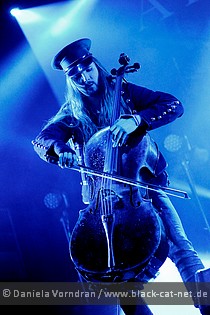 Interview with
Interview withPerttu Kivilaakso (Apocalyptica) about the opera “Indigo”, written by Perttu Kivilaakso and Eicca Toppinen
Having seeing the “Indigo” opera, a sold-out and enormous production by Finnish National Opera and two members of APOCALYPTICA, I was enthusiastic to reach to the author for an interview. As the places for interviews are not always fancy backstage apartments or rich hotel premises, our interview place is pretty casual - next to Ooppera’s box office, in some quiet corner. A little quite at the beginning, Perttu quickly gets engaged into details and speaks about his brainchild with big enthusiasm; and last but not least, I thank myself for seeing the opera first, as I am able avoid basic questions and ask for specific details. The interview took place on February 13th, 2016. The opera can be watched online throughout 2016 HERE!
Reflections of Darkness [RoD]: Good evening, Perttu, it is a privilege to have this interview, that we do for Reflections Of Darkness. As of today, the opera is a huge success. I think you have sold out almost every gig.
Perttu: Yes, every single gig.
RoD: So now we know it went great. But was it so when you were just starting to make the opera, were there any concerns? Did you thought about any risks? Or it just went smoothly?
Perttu: Of course it did not go smoothly, as this is such a huge project, of course. The initial idea started 3.5 years ago, when we played with APOCALYPTICA in one Finnish classical festival. The festival was managed and directed by the same person who is the artistic director of Finnish National Opera. There we played with huge symphonic orchestra and with one of most famous Finnish opera singers of all time Karita Mattila. It was on that concert where she got an idea "I want to have an opera from those guys". To create something unique for this [Ooppera] hall. And we thought that this feels like a great opportunity to try a something new once again and do
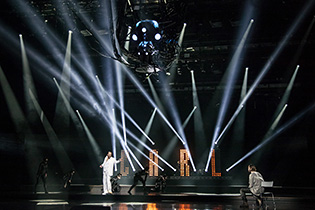 something cool. I have been a huge opera lover for my whole life, so of course it felt like an exciting chance. We did not think about risks at the start. The process was long, of course, it took couple of years, to put everything together, to find out the story, and first of all, the right people to work with this - that of course took already a couple of months.
something cool. I have been a huge opera lover for my whole life, so of course it felt like an exciting chance. We did not think about risks at the start. The process was long, of course, it took couple of years, to put everything together, to find out the story, and first of all, the right people to work with this - that of course took already a couple of months.The story was very exciting, I was strongly involved in the entire process actually. We worked with the director of the opera and the author who brought the final libretto, and we were really sitting together many weekends, all night long, and just trying to talk about weird science fiction stuff - to find the right soul for the story. Actually, I think it was blessing in that sense that I was so involved already with the characters, [while] developing them, before even starting to compose - so when I started to compose, finally, music and themes for those persons, I already knew them and could relate to every single one of them. And I think that was the most rewarding part of this project, that I fell in love with all "my" characters. It is incredibly exciting. The composing took place approximately one year ago, around Christmas (2014) time, after we finished our ‘Shadowmaker’ album with APOCALYPTICA. There were five weeks’ time to finish this opera composing, main project, before we started to tour again. It was very-very hectic and challenging in that sense.
RoD: Opera is not really a documentary, a literal story - it is about drama, about story ups and downs. And you chose that background - basically, post-apocalyptic and cyberpunk. How did you arrived to this particular choice of setting?
Perttu: Of course, me and Eicca, we are un-typical opera composers, composers that are from rock world, un-typical choice for this kind of opera hall, so we wanted all aspects to be kind of “un-typical” for normal operas. At least, I could not find or get in my mind a single opera that tells
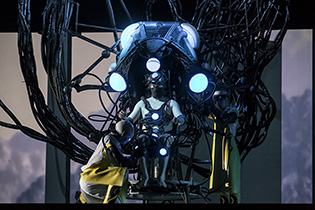 something about a far future. Science fiction was definitely an interesting subject, or approach, for this kind of dystopic world, where some corporation is just ruling. Basically, there are no nations anymore, people are suffering, like... (in exciting voice) I love this kind of [future-based dystopian] movies. So we wanted movie or [sci-fi] "comic" approach for the opera, from the story's point of view.
something about a far future. Science fiction was definitely an interesting subject, or approach, for this kind of dystopic world, where some corporation is just ruling. Basically, there are no nations anymore, people are suffering, like... (in exciting voice) I love this kind of [future-based dystopian] movies. So we wanted movie or [sci-fi] "comic" approach for the opera, from the story's point of view. RoD: Do you have any particular inspiration from cyberpunk genre?
Perttu: Of course, something like “Blade Runner”, “Judge Dredd”, those kind of worlds could be pretty easily adapted into [Indigo’s world], the story would easily happen in such a place, where only money really rules, people are with greed, and they put entire population under their power and they just - greeting for more power. That's the main evil in Indigo as well. But - because it is an opera, for me it was especially the most important thing to have the main focus - on the love, of course. Opera needs love and sorrow and big death. In that sense it was interesting to try to put that cyberpunk surrounding in form of a regular opera, which would serve for all these emotions. Because that's something that we were definitely seeking to capture, emotion level of many operas, many masterpieces from history. We definitely wanted this piece to relate more to big romantic Inalain operas than to any rock music of nowadays. That's one of the reasons why there is no, for example, a performing rock band. There are no drums, there are no electric guitars. We wanted to have it traditional, in opera form, because it was done for this hall, for "opera purposes".
RoD: It was a first opera for you. Did you have to study opera making, before starting making the opera?
Perttu: Not exactly for this [occasion], but I've been studying it for my entire life, by listening to thousands and thousands of operas, basically by remembering by heart most of them (laughs). But, of course, it is so different - to start to do such a work. Though, we approached the composing pretty much with the same way as doing songs for our own band. And you cannot let the length,
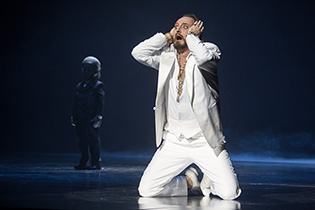 for example, to scare you, when you start to do it, you have just to start from somewhere and then try to follow it throughout. The length is of course a challenge, because it is nearly three albums of music, two hours, so we really had to do our best in getting enough great melodies, enough great choruses, big action parts.
for example, to scare you, when you start to do it, you have just to start from somewhere and then try to follow it throughout. The length is of course a challenge, because it is nearly three albums of music, two hours, so we really had to do our best in getting enough great melodies, enough great choruses, big action parts. RoD: I do know already that you do not want any rock parts in the opera, but have you thought about any cameo of APOCALYPTICA in the opera?
Perttu: In the beginning, strongly yes. I was very close actually to even write myself into the story. Like, we have that machine, which brings Daniel to the “other side”. The original idea was to put it to sound of APOCALYPTICA cello, which would have been played by me, of course (smiles), but in a final end, we wanted to skip it, because that would have, in my opinion, distracted the work too much, it would have been too much about APOCALYPTICA. The biggest challenge for us was to capture the opera feel. That was the reason why we actually skipped the idea of using own cellos in here. But if I ever going to do any other operas, I want to perform there as well (laughs).
RoD: I follow yours and Eicca's Instagram, and I saw him lately with the orchestra of Indigo. Is he playing together with the orchestra? Once, or?
Perttu: Yeah, it is once. That's a cool thing, because they even asked me to come in there, but I wanted just to enjoy the performance.
RoD: It was six performances already, if I remember correctly.
Perttu: Yes, today it is number seven.
RoD: And, you are the author. I think, you had an experience like nobody else, watching so many installments. What thoughts you got along this way, how what do you feel along these actual several performances?
Perttu: Especially the premiere. I honestly can say I nearly have no clue how it went. I remember almost nothing about the evening, because it was so exciting, finally to see the work there [on stage] with full force. The performance, it was so emotional, that I didn't even get a grip of the work. Now, I have watched every single show, and of course, it is getting easier to handle all the big emotion (laughs). But I love most of the music so much, that it is incredible to hear it in there, without
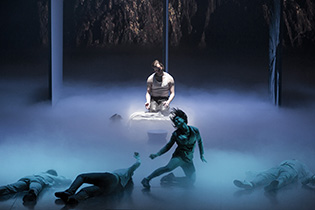 performing it myself, it feels just absurd, that everybody had LEARNED my songs. That feels strange, all of these people, they are coming to listen to it. I am actually feeling very blessed with the whole thing.
performing it myself, it feels just absurd, that everybody had LEARNED my songs. That feels strange, all of these people, they are coming to listen to it. I am actually feeling very blessed with the whole thing.RoD: I think it is really great, that you are, being a highly acclaimed band, having all these resources, do not stick to the rock gig/ album making routine, but push the boundaries and explore different sides of creativity.
Perttu: That is something that we try to do also with APOCALYPTICA. Of course, Indigo was not really APOCALYPTICA’s project, in that sense the name of our band was not even used in this occasion. But as musicians, definitely, me and Eicca, we both wanted to try different things, whether it is been composing, or films, or games, or whatever. From other projects, besides APOCALYPTICA, we also learned a lot, from every other step that we have taken. For example, I think that Indigo, and diving into the world of handling such a huge structure, that this opera is, I think I learned A LOT as a music maker.
RoD: You have very striking designs and unique scenography - that platform, that splits stage into two and allow of parallel acting on two layers. Who had designed these?
Perttu: Of course, the artwork has been done by chosen persons from the opera, but we had lots of stuff to do with the entire thing. Like, for example, Sami Parkkinen, who was the writer, and Vilppu Kiljunen, the director of entire thing, and myself mostly. We talked so much about how this should look, and what should we ask, what do we want to see, how it should be put. And also in the story it was already written quite a lot of information: it is happening somewhere near by the mountains, for example, where the guy [Daniel] escaped on top of the hill, we find Daniel from such a place, basically, they die in the same place, even it is, maybe, in another dimension. There things were in the story already. We actually did a whole movie script out of the work, before composing. And after the movie script with all the exact details, who is walking how and when and where - then we started to composing. After the music was ready, we finalized the lyrics, the libretto, to fit to those melodies. I think it was the perfect way of working, because it gave us, as composers, a freedom to really not care about text too much, just knowing, that "this is what happens now", but I am fully free to create my own music, not following every single word.
RoD: I watched Indigo and I noticed that you introduced a lot of story aspects that is untold, remains a mystery. For instance, maybe you can comment - when person ends up in his sub-consciousness, how come that he ends up with other people, even with dead people?
Perttu: The explanation it might be so,
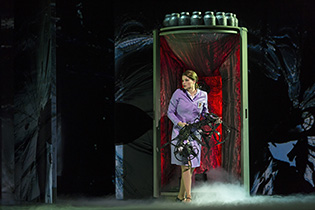 that there cannot be anyone else in your own mind. If we create some weird state of mind, which is actually a place, and the person is dead already in this world, like Carl, for example - he [can be] still living in some level of that sub-consciousness. Daniel is able to reach the place, but at the same moment he comes in there, Carl actually realizes that he cannot stay anymore, he is not the ruler of the "world" anymore. But kind of I find it very exciting that - going back three years when we get the gig - they asked from me: “what do you want from your opera to tell about”, and I was thinking: “huge responsibility for many months, oh my God, what kind of a story?” And then I realized, let's f*cking kill everyone! (laughs) Like, such an opera that we kill every single person in a planet and it tells about apocalypse, world end. That's when it started to go towards the dystopic future. And I feel also that we wanted to a find a story that does not explain everything too clearly, so the end, the audience would actually think, why is now Aurelia alone there - of course it is obvious: she entered Daniel's mind which caused Daniel to leave. Aurelia is there alone, but is it the sad end, or happy end, or - what the hell happens? Even I have no idea actually (laughs).
that there cannot be anyone else in your own mind. If we create some weird state of mind, which is actually a place, and the person is dead already in this world, like Carl, for example - he [can be] still living in some level of that sub-consciousness. Daniel is able to reach the place, but at the same moment he comes in there, Carl actually realizes that he cannot stay anymore, he is not the ruler of the "world" anymore. But kind of I find it very exciting that - going back three years when we get the gig - they asked from me: “what do you want from your opera to tell about”, and I was thinking: “huge responsibility for many months, oh my God, what kind of a story?” And then I realized, let's f*cking kill everyone! (laughs) Like, such an opera that we kill every single person in a planet and it tells about apocalypse, world end. That's when it started to go towards the dystopic future. And I feel also that we wanted to a find a story that does not explain everything too clearly, so the end, the audience would actually think, why is now Aurelia alone there - of course it is obvious: she entered Daniel's mind which caused Daniel to leave. Aurelia is there alone, but is it the sad end, or happy end, or - what the hell happens? Even I have no idea actually (laughs). RoD: And who is the Ancient Child [a character, that takes person away, removes them].
Perttu: This is the funny one. I was buying some sausages and stuff, one year ago, before new year's eve (2015) in a grocery store. And we have been still thinking about the story all the time, and it have been changing a little bit, while [we were] already composing. But suddenly as I was putting those sausages and eggs [to cashier], about to pay for them, I heard that melody. Honestly, this is true story! I heard the melody of little boy, exactly the same time as realizing that we do need a little boy to the end, that it makes [character departure] more fragile, more horrible scene, and we didn't have the little boy written in the story earlier. I heard the melody of little boy and I realized, yes, this is perfect! And it felt already then that it is the most beautiful melody of the opera, and I just had to say to everybody [in the shop] - “sorry, sorry” ,I left all the stuff in the shop and run to my car and was driving back home furiously, in order to be able to recall the theme before forgetting, because I knew that is such a cool, great moment. That is exactly interesting example about composing - that sometimes you get that feelings that you are already know at that moment that this is the key to something. And from that moment on we did added a little child to the story, and of course for me it feels that he is a symbol of death, the ageless child. We had a 6-years old boy performing, and I feel [that scene] is creepy and horrible, and in the same time very beautiful (laughs lightheartedly).
RoD: I was really impressed by the opera, it is a huge work and I am so happy for you and Eicca that you pulled it off. It is so unusual to see that big contribution to culture. Thank you very much!
Opera Images courtesy of The Finnish National Opera/Ballet. Photograper: Sakari Viika.




